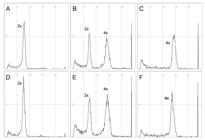Abstract
We report the in vitro induction of polyploids from two cassava cultivars by colchicine treatment. Shoot nodal segments, collected from in vitro cultivated plants of Porquinho and Vassourinha cultivars, were used as explants. Explants were treated in liquid media without and with colchicine (0.05, 0.10 or 0.15%), at 90 rpm, in the dark, for 48 or 96 h. Normal-like and putative-polyploid phenotypes were recovered from in vitro culture, for both cultivars. All plants from the putative-polyploid group were confirmed as tetraploids by flow cytometry and root tip chromosome counting, whereas no association was found between ploidy level and phenotype in normal-like plants. Mixoploids were also recovered from both cultivars. Vassourinha was more responsive to colchicine treatment than Porquinho. Tetraploid plants have fewer, but bigger, stomata guard cells than those in diploids. Colchicine at 0.10% for 96 hours induced a high number of tetraploids in both cultivars.
Key words:
Chimera; chromosome doubling; colchicine; Manihot esculenta; polyploidy

 Thumbnail
Thumbnail
 Thumbnail
Thumbnail
 Thumbnail
Thumbnail


